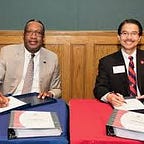Dr. Shaun McKay on Face-to-Face Modality Versus Online / Hybrid Instruction
MANORVILLE, NY /November 10, 2020 / The education industry has completely transformed due to the COVID-19 pandemic. Educators and students were forced to transition from in-person classes to online courses in a matter of days. However, arguably the largest educational debate of the year began when it came time to start a new semester in the fall.
Schools around the nation, elementary through university, were forced to decide whether to continue solely with online courses, offer in-person instruction, or use a hybrid system of the two. Education expert Shaun McKay recently discussed the costs that these styles of learning have moving forward.
“Higher education has been seeing the implementation of massive open online courses (MOOCs) for a couple of years, even before the pandemic began,” Shaun McKay said. “However, the American Federation of Teachers has pointed out that online courses, while convenient, may not entirely be the answer.”
Shaun McKay explained that many education professionals and teachers agree technology cannot substitute for teacher-student engagement. Many of the skills acquired in a university setting can’t be accessed online. Higher education student success is highly based on their interactions with scholars and students from varying backgrounds and cultures.
Shaun McKay added that advancements in open online courses could further devalue teachers and their work. Many investors see online learning ventures as some of the latest, most profitable startups. These investors are often more interested in profit than what works best for students’ success, resulting in marginalizing faculty to save cost. Shaun McKay fears that there could be a transformation in teaching online that would be more focused on profit than a quality education.
“Right now, hybrid courses are seen as a generally useful option during the coronavirus pandemic,” Shaun McKay added. “They’re similar to online courses, but students continue to have ways to interact in-person with peers and faculty.”
Shaun McKay explained that hybrid courses are a generally new concept, so they’re not currently offered at all schools or for all classes. However, students and faculty have found them to be a reasonable answer to the challenges of the coronavirus pandemic. Students and faculty enjoy the benefits of face-to-face interaction, along with the convenience and safety of online instruction.
“Different students have different strengths and weaknesses when it comes to learning in various class structures,” Shaun McKay said. “While some may be able to thrive in an entirely online setting, it is widely agreed among higher education experts that adult face-to-face involvement is a key element of success. This can be through traditional face-to-face learning methods or through hybrid settings as needed.”
Originally published at https://www.squarepegeducation.com.
